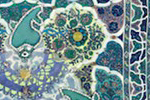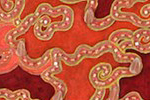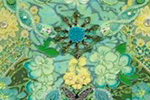Summer 2015: Prose
How to Cure Cancer
Non-fiction by Susan Fleming
You have to be nice at first so the doctors will like you and see that you deserve to live.
You have to be polite so that cancer won’t turn you into someone you’re not: a bitter angry person.
You have to buy lime green Converse high tops because that’s what people who get cancer do, they jump out of planes, they quit their jobs and move to Bali, they do what they’ve always wanted to do. But you’re twenty-five. You don’t know what you’ve always wanted to do. You just started.
You have to call in sick the next day and so does your fiancé and you have to drive to Canada because you want to go to another country before you die. You have to cross the border and look around and wonder, why did we come here, and think about the endless drive back down I-5.
You have to go back to work and have people not look at you except Kathy from Sales who grabs your arm and says Oh. My. God. and you’re embarrassed people will hear.
You have to be polite when people ask if you smoke.
You have to be polite when they ask if it runs in your family.
You have to be polite when they ask if you had any symptoms.
They want to know why it happened to you, so they can tell if it’s going to happen to them.
You have to get married. The wedding’s in a month. You have to get married so you can be normal like you’ve always wanted. You are going to have a happy marriage, followed by happy children. Even with a tumor, you think you can show your family how it’s done. How it could have been.
You have to get fitted for your wedding dress with bandages across your neck while everyone pretends you look beautiful.
Your friends come over with their jewelry boxes. You will find the necklace that covers the scar. It is agreed by all that scars should be hidden.
You have to stand at the altar and repeat your vows and hear the murmur when they get to “in sickness and in health.” Your mom has already told you how the church ladies think it’s such a romantic story, how your fiancé has stayed with you.
You have to drive to Cambridge three days later so your husband can finish law school. You take a file thick with medical reports and a letter transferring your care from a hospital in Oregon to Harvard Medical School, where they will consider everything that’s been done for you a backwater hack job.
You have to get radiated. You have to go home on the T because your husband has class. The doctor says stay ten feet away from children or women of child-bearing age. You wonder if the doctor has ever taken the subway? You wait for three trains until there’s an empty one where you won’t radiate anybody.
You watch movies with your husband on the couch in front of the fireplace and when Beth dies in Little Women he cries for the second time you’ve ever seen and says “I don’t want you to die.”
In Cambridge you learn about organic. You learn about wellness. At first you’re intimidated by the beefcakes at the gym but finally you don’t care. It gets easier and easier not to care. You think it’s lucky to have cancer when you’re young. All the years to come that won’t be wasted worrying about stupid things.
Oregon seems far away, with Mount Saint Dad and his violent eruptions. No more red alerts and radars trying to sense trouble and depressions and bad moods. Exhausting. You and your husband go to a Red Sox game and it’s just a Red Sox game. You go for ice cream and it’s just ice cream.
And the leaves, the fall colors are amazing, plum, wine, crimson. You tell your mother about them on the phone and she says the leaves in Oregon are nice too and you say “it’s different here, it’s different” or do you only shout it in your head?
Your husband graduates. He has a job offer in Portland. You’re not ready to go home.
In Oregon the cancer is back. The doctors use the word “pernicious.” You are not as nice anymore. The reports used to describe you as a “delightful 25 year old” — but by 29, you’ve been downgraded to merely “pleasant.”
You start to lose hope. You are starting to feel like it’s your fault. You read a book about “cancer personalities” and realize that you have one and that everything you’ve done and not done and what you are and aren’t has been leading to this disease and that it finally makes sense, why you’ve never fit in, why the world has always seemed full of sadness and pain, because you were destined to get sick and die.
You’re getting desperate. These “brilliant” doctors can’t fix this, so they can’t all be right. You will have to do this yourself. If your old life caused cancer, then you will need to make a new life. You will have to let go, one by one, of beliefs in medicine, in religion, in your parents and your heritage, your family, traditions that don’t mean anything, friends you don’t even like. You throw old letters in the fire, report cards, birthday cards, like General Sherman’s march it all has to be mowed down, cleared out — one of them is the culprit. You will find it.
And finally there is nothing left except your husband. The marriage, this love, it must be wrong too, it must be part of the disease. You have to get rid of it. You want to love and you want to live, but you want to live more.
You will slay people, to live.
| |

|

|
 |
 |
 |
 |
 |
||||
|
As hot as the summer sun, 13 poets breathe light into the darkness. |
Tending to the worn, imperfect edges of life, five writers grapple with perimeters. |
Like a swarm of bees or a flock of birds: four artists layer meaning through detail. |
Four teens observe their world and put words to page like only young voices can. |
From emerging to established writers – meet the women behind our seventh issue’s voices and visions. |

